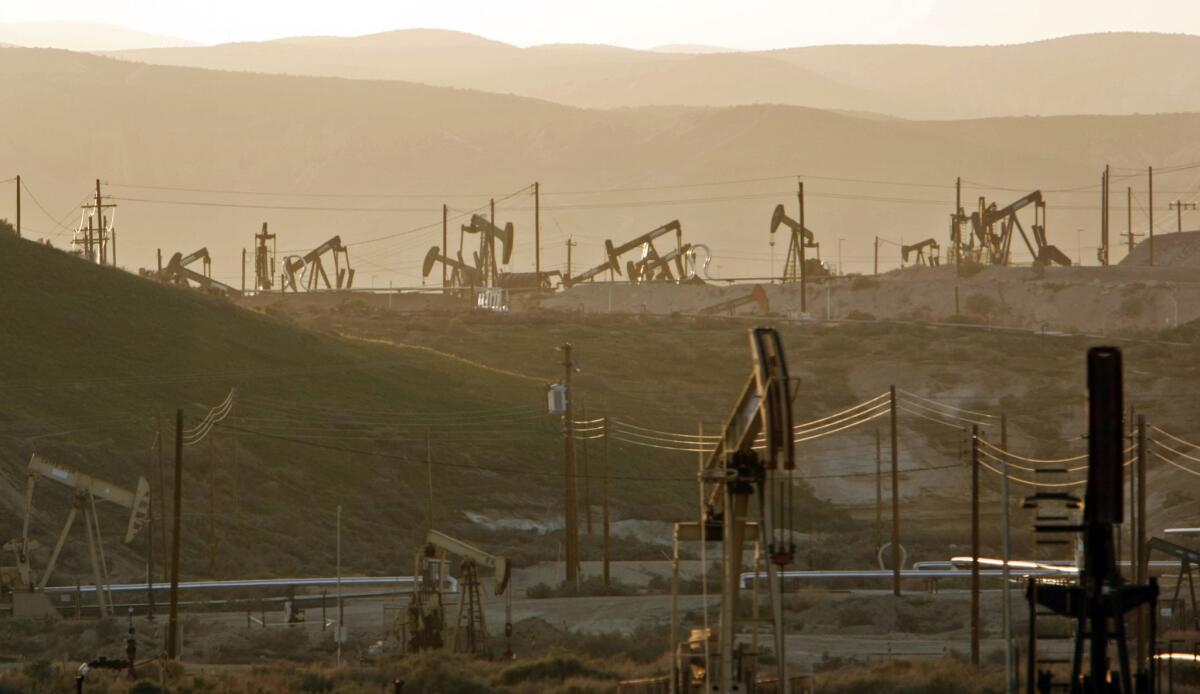Opinion: Hey, Bureau of Land Management, why the rush to frack?

- Share via
Citing a report that even its author says is based on incomplete information, the Bureau of Land Management wants to resume issuing oil and gas drilling leases on federal land in California. So in the absence of clarity, BLM officials plan to gamble with some of California’s water supplies.
No.
The issue here centers on hydraulic fracturing – fracking – and related drilling techniques that inject mysterious liquid compounds into the ground to create cracks in oil-and-gas-trapping rock formations, making it possible to recover deposits that have been hard or too expensive to collect under previous technologies.
And if the federal government needs better data on the effects of fracking, it can go visit Pennsylvania’s Department of Environmental Protection, which found at least 200 water wells had been contaminated by nearby fracking operations in the massive and gas-rich Marcellus shale bed.
“The 243 cases, from 2008 to 2014, include some where a single drilling operation impacted multiple water wells,” the Associated Press reported. “The problems listed in the documents include methane gas contamination, spills of wastewater and other pollutants, and wells that went dry or were otherwise undrinkable. Some of the problems were temporary, but the names of landowners were redacted, so it wasn’t clear if the problems were resolved to their satisfaction. Other complaints are still being investigated.”
Or BLM could check with the Government Accountability Office, which reported earlier this summer that water contamination from fracking is a significant problem and that the Environmental Protection Agency needed to step up enforcement and oversight. That may not be so easy, given the politics of energy production.
The study upon which BLM is basing its decision to go ahead with fracking on federal lands in California notes that it was based on insufficient data about the impact on water wells:
“There are no publicly reported instances of potable water contamination from subsurface releases in California,” the report says. “However, more than half of the stimulated oil wells in California have shallow depth (less than 2,000 feet). Shallow hydraulic fracturing poses a potential risk for groundwater if usable aquifers are nearby. Some shallow hydraulic fracturing occurs where groundwater is highly saline, or non-existent. However, investigators could not determine the groundwater quality near many hydraulic fracturing operations and found that existing data was insufficient to evaluate the extent to which contamination may have occurred. California needs to develop an accurate understanding about the location, depth and quality of groundwater in oil- and gas-producing regions in order to evaluate the risk of well stimulation to groundwater.”
The report also notes that fracking wells in California tend to be vertical, rather than the horizontal technique used in most of the rest of the fracking zones (a function of varying geologic formations). So the fracking in California would use less water than elsewhere – up to 210,000 gallons of water per well compared with the 4 million gallons used in Texas. Based on an estimate of 100 to 150 fracking operations per month, fracking would consume up to 400 million gallons of water.
“Even with the relatively low water use of California operations, hydraulic fracturing can contribute to local constraints on water availability given the extreme drought in the state,” the report notes.
So not only can the fracking contaminate local water wells and aquifers, based on the experiences of other states, and has been conducted in skepticism-fueling secrecy (hello, North Carolina), it will be yet another siphon of increasingly over-subscribed water resources.
So why does BLM think this is a good idea?
Follow Scott Martelle on Twitter @smartelle.
More to Read
A cure for the common opinion
Get thought-provoking perspectives with our weekly newsletter.
You may occasionally receive promotional content from the Los Angeles Times.










